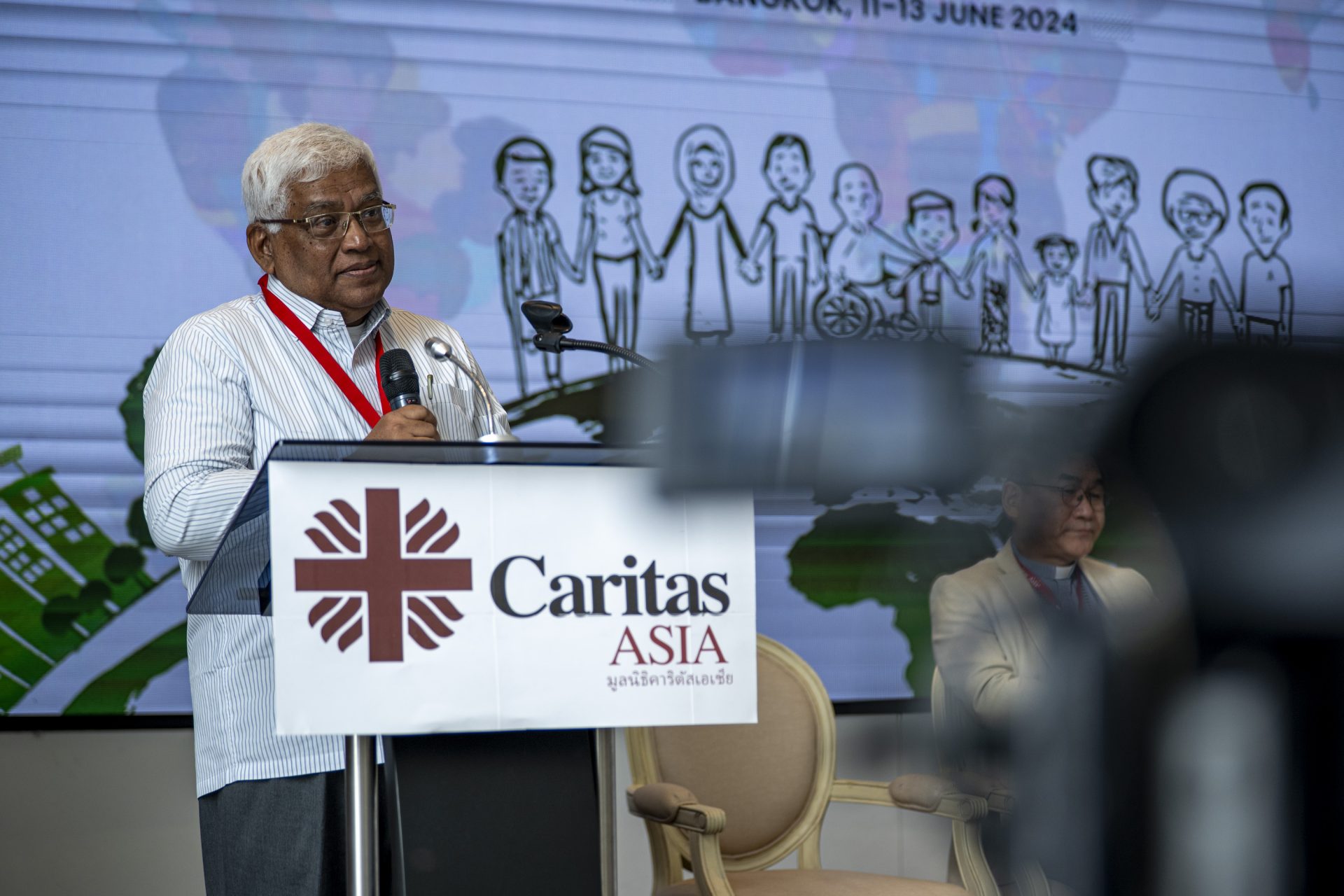Dr. Benedict Alo D’Rozario, President of Caritas Asia, underscored the importance of fraternal cooperation and Caritas’ identity as a faith-driven humanitarian organization during his speech at the Partners’ Forum of Caritas Sri Lanka in Colombo.
He emphasized the centrality of charity in the Church’s mission and called for strengthened solidarity among Caritas organizations worldwide.
Speaking on the foundation of Caritas’ work, Dr. D’Rozario highlighted that “Caritas identity is rooted in the Gospel and Catholic Social Teaching.”
He referenced Matthew 25:31-46, explaining that charity is not just an obligation but a measure of faith. “Loving your neighbor means feeding the hungry, welcoming the strangers, and so forth,” he said, stressing that this reflects both love for God and solidarity with the suffering.
Quoting Pope Benedict XVI’s Deus Caritas Est, Dr. D’Rozario reiterated that “the Church’s deepest nature is expressed in her three-fold responsibility: of proclaiming the word of God, celebrating the sacraments and exercising the ministry of charity.”
He also affirmed that “charity is not a kind of welfare activity which could equally well be left to others but is part of her nature, an indispensable part of her very being.”
He traced the evolution of Caritas’ approach, from earlier economic-focused aid to a more holistic model of “integral human development.”
This shift, he noted, aligns with the teachings of Pope John Paul II, who emphasized that development must encompass economic, social, and spiritual dimensions. “Each person is responsible for developing him- or herself and, therefore, he or she has to become agents of their own development,” he explained.
Pope Francis’ vision of Caritas was also emphasized, particularly his description of the organization as “the caress of the Church to its people, the caress of the Mother Church to her children, her tenderness and closeness.”
Dr. D’Rozario detailed the key Catholic Social Teaching principles that guide Caritas’ humanitarian work, including the dignity of the human person, preferential option for the poor, economic justice, and care for creation.
He stressed that these principles must be actively implemented in Caritas’ mission across different regions.
He also focused on the concept of fraternal cooperation, describing it as “working together with a common purpose, shared vision and co-responsibility.”
He highlighted Caritas Internationalis as a prime example, stating that its initiatives “encourage a shared understanding of service, communion, and mission.”
Dr. D’Rozario pointed out that authentic fraternal cooperation should be “characterized by honest feedback and joint planning, accompaniment, transparency and accountability on both sides, and a genuine openness and sensitivity to others’ needs, feelings, expertise, experience, and wisdom.”
He added that it should be based on “mutual respect, trust, and goodwill.”
Strengthening Global Solidarity
Regarding Caritas Internationalis membership, he stressed the importance of balancing local autonomy with global commitments.
“Caritas members strive to balance their own autonomy with the obligations that arise from belonging to the Caritas confederation,” he said, urging organizations to reinforce their commitment to strategic planning, organizational development, and capacity building.
Dr. D’Rozario also addressed the challenges of Caritas’ presence in different countries, emphasizing that such representation must “enhance Caritas fraternal cooperation and not diminish it.”
He outlined specific principles guiding Caritas’ presence abroad, including securing agreement with local bishops and national Caritas offices and ensuring alignment with national social pastoral plans.
He called for stronger collaboration not only within Caritas but also with external organizations, provided that such partnerships align with Caritas’ mission.
“To work with respect for the values and ethos inherent in other organizations” is essential, he noted, while ensuring that Caritas’ own principles remain clear and uncompromised.
Dr. D’Rozario concluded with a call for a deeper commitment to solidarity, emphasizing the need to embrace a culture of listening and understanding.
“Listening with heart, seeing by our heart, and taking from our heart is our ‘way of proceeding’ or ‘modus operandi’ to facilitate coordination, fraternal cooperation, and collective work in serving, accompanyin,g and defending the poor,” he said.







